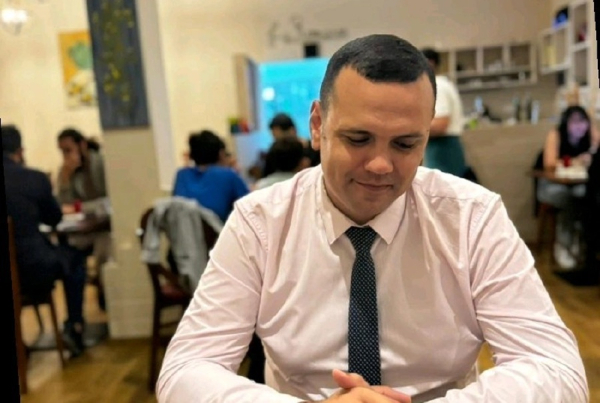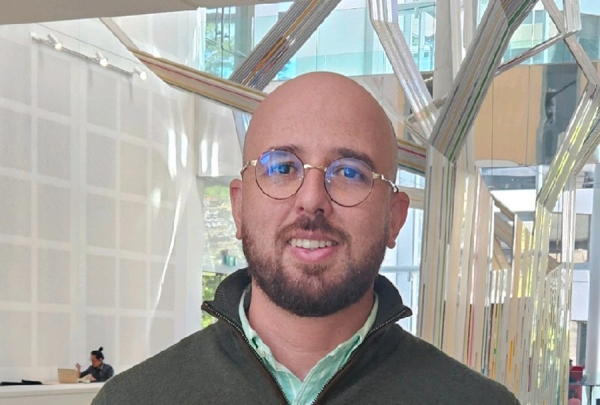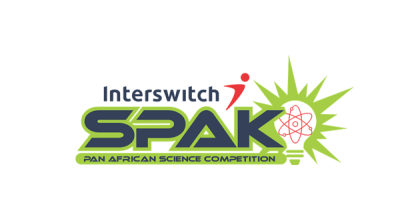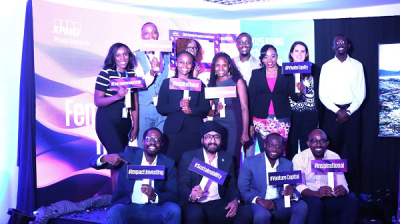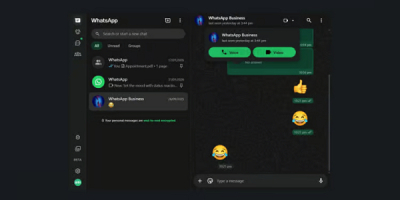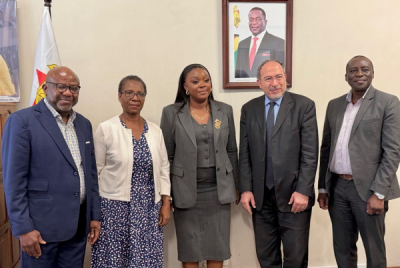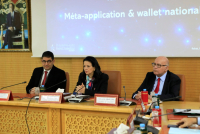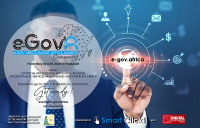-
Mehdi L. Sariak founded Docteur 360 in 2022 to streamline access to medical appointments in Algeria.
-
The platform connects patients with doctors nationwide and automates appointment management.
-
Sariak previously held senior roles at Société Générale Algérie before launching his healthtech venture.
Algerian entrepreneur Mehdi L. Sariak is leveraging technology to improve access to healthcare in Algeria by simplifying how patients book medical appointments.
Mehdi L. Sariak founded Docteur 360 in 2022 as an online platform that allows patients to quickly find a doctor and book appointments directly. He positioned the platform as a health service with a strong human dimension that combines medical culture with personalized support. The company aims to modernize the patient journey and make access to care more fluid, faster and more equitable by removing common booking obstacles.
The platform allows each patient to search for a doctor, compare available profiles and select the specialist who best fits their needs. Direct access to practitioners’ profiles strengthens transparency and builds trust at the time of booking. Docteur 360 focuses on simplifying the patient pathway and reducing waiting times for appointments.
The company offers a broad range of services designed for both patients and healthcare professionals. The platform provides a nationwide directory of practitioners across Algeria, automates recurring tasks such as appointment management, reminders and notifications, and simplifies follow-up from booking to consultation. These features reduce delays and limit missed appointments.
Sariak holds a bachelor’s degree in business administration and management obtained in 2006 from Collège de Sherbrooke. He also earned a master’s degree in banking, financial, corporate and securities law in 2009 from IAE Paris.
He began his professional career in 2006 at Société Générale Algérie, where he successively served as credit analyst, senior banker, branch manager in Algiers and deputy director in charge of large corporates. Between 2016 and 2020, he chaired Oxonto, a French company, now closed, that specialized in wholesale trade of computers, IT equipment and software.
Sariak is positioning Docteur 360 as part of Algeria’s broader digital transformation in healthcare, where entrepreneurs are using technology to address structural inefficiencies in patient access and care coordination.
This article was initially published in French by Melchior Koba
Adapted in English by Ange J.A de Berry Quenum
- Ahmed Hormal founded Keema in 2020 to deliver custom AI applications and cloud infrastructure to organizations.
- Keema renewed its Qualiopi certification in 2025, underscoring the quality of its AI-focused training programs.
- Hormal concurrently serves as Head of Engineering at Yakeey while building a career across Capgemini, ING Direct France, Yomoni, SNCF Connect & Tech, Sonepar and BforBank.
Moroccan entrepreneur and computer scientist Ahmed Hormal is positioning his company Keema as a provider of practical and accessible artificial intelligence solutions for organizations seeking to accelerate their digital transformation.
Hormal founded Keema in 2020 to support organizations that want to fully leverage digital technologies and artificial intelligence. The company designs tailor-made applications and deploys stable cloud-based technical environments.
Keema builds infrastructure that supports business growth and ensures uninterrupted operations. The company provides performance-oriented tools that allow teams to rely on resilient systems in their day-to-day activities. Hormal’s strategy centers on creating solid digital foundations before layering advanced AI capabilities.
Keema integrates artificial intelligence directly into clients’ digital products and operational tools. The company also advises organizations that seek to understand how AI can transform their business models and internal processes.
Its training programs present a structured view of AI opportunities while highlighting the technology’s limitations and operational challenges in corporate environments. Keema provides specific training on intelligent assistants built on so-called “generative” AI systems.
The training targets software engineers, technical managers and professionals interested in emerging AI approaches. The programs teach participants how to design intelligent assistants that integrate into existing systems. Keema also offers a dedicated track focused on application quality.
In 2025, Keema renewed its Qualiopi certification for training activities, reinforcing the rigor and credibility of its educational processes.
Alongside his work at Keema, Hormal serves as Head of Engineering at Yakeey, a Moroccan digital real estate company. Previously, he co-founded Biilz in 2022, a digital receipt aggregation platform, and served as Chief Technology Officer until 2024.
Hormal holds a bachelor’s degree in mathematics and computer science from Hassan II University Mohammedia, obtained in 2011. He earned a master’s degree in computer engineering in 2013 from Blaise Pascal University (Clermont-II).
He began his professional career in France in 2013 as a software developer. He worked at Capgemini, at financial firms ING Direct France and Yomoni, and at technology company SNCF Connect & Tech. In 2019, he became Technical Manager at Muvraline. He then assumed a similar role in 2020 at Sonepar, a distributor of electrical equipment and solutions. Between 2023 and 2025, he served as Technical Manager at BforBank, a French online bank.
Melchior Koba
Interswitch has launched Season 8 of InterswitchSPAK, a national STEM competition in Nigeria. The scholarship prize pool exceeds 40 million Naira (approximately $30,000) and includes five-year academic grants, laptops for the nine finalists, and cash prizes for their teachers. Parents and guardians can register students by May 24, 2026.
KPMG has opened applications for the 2026 'Female Founders in Africa' competition, targeting women entrepreneurs leading high-potential startups across the continent. The program spans various sectors, including tech, healthcare, and agriculture. Participants can benefit from mentorship, increased visibility, and networking opportunities with investors. Applications are open through Saturday, February 28.
WhatsApp is rolling out voice and video calls directly to its web browser, eliminating the need for a desktop app. The feature launches with one-on-one calls, while group calls, call links, and scheduled calls are set to arrive soon. All conversations remain protected by end-to-end encryption, and screen sharing is also available, which will be particularly useful for Linux users.
- Zimbabwe, UNESCO discuss AI and digital governance cooperation
- Talks align with Smart Zimbabwe 2030 digital plan
- Zimbabwe ranks 149th in 2024 UN e-government index
Zimbabwe is exploring new areas of cooperation with UNESCO in artificial intelligence, digital transformation and digital governance following a meeting on Tuesday, Feb. 10, between ICT Minister Tatenda Mavetera (pictured, center) and Tawfik Jelassi, UNESCO's assistant director-general for communication and information.
"Our discussions covered artificial intelligence and national policy frameworks, digital transformation in the public sector, the regulation and governance of digital platforms, and the development of digital skills for both youth and adults," Jelassi said.
Mavetera highlighted the transformative role of AI and emerging technologies in government operations and national development, stressing the importance of research, innovation and collaboration with academic and technical institutions to foster sustainable technological solutions.
The engagement aligns with Zimbabwe's digital transformation ambitions. Through the "Smart Zimbabwe 2030 Master Plan," the government aims to fully integrate ICTs across society and all economic sectors to drive rapid and sustainable socio-economic development. The plan references an International Telecommunication Union study showing that a 10% increase in a country's digitalization score leads to a 0.75% rise in GDP per capita.
Artificial intelligence is positioned as a key catalyst in this strategy, with potential to boost efficiency, drive innovation and improve services across sectors from agriculture and health to education and public administration. The recent UNESCO collaboration has focused on AI, with the organization helping to develop Zimbabwe's national strategy and assess the country's readiness.
However, an assessment report published in July 2025 notes that to fully harness AI's potential, Zimbabwe must establish a comprehensive national strategy with a plan to address key challenges including foreign dominance and cultural imposition, loss of human autonomy, financing constraints, technical infrastructure limitations, and research capacity gaps exacerbated by brain drain.
Zimbabwe currently ranks 149th out of 193 countries in the United Nations' 2024 E-Government Development Index, with a score of 0.4481 out of 1, below the global average of 0.6382.
Isaac K. Kassouwi
-
Morocco signed eight memorandums of understanding to launch the operational phase of the Idarati X.0 unified digital services platform.
-
Authorities will build the system around a national digital wallet authenticated through the electronic national identity card (CNIE).
-
Morocco ranks 90th globally and 4th in Africa in the 2024 UN E-Government Development Index, with 600 public services already online.
Morocco is accelerating the structuring of its e-government ecosystem. Authorities signed eight memorandums of understanding in Rabat on Tuesday, February 10 to launch the operational phase of the “Idarati X.0” project, a meta-application designed to become the single entry point for digital public services.
The Ministry of Digital Transition and Administration Reform leads the project in coordination with the National Commission for the Control of Personal Data Protection (CNDP). The initiative aims to structure a comprehensive ecosystem around a national digital wallet. Authorities will use this core infrastructure to allow citizens to access multiple administrative services through a single interface, relying on the electronic national identity card (CNIE) as the authentication foundation.
The agreements commit several key institutions, including the Ministry of Youth, Culture and Communication, the Ministry of Transport and Logistics, the National Social Security Fund (CNSS), the National Road Safety Agency (NARSA), and the National Agency for Land Conservation, Cadastre and Cartography (ANCFCC). Other public administrations also joined the framework, underscoring a cross-sector approach based on system interoperability.
Authorities designed Idarati X.0 as more than an aggregator of existing services. The project seeks to redesign user pathways, reduce fragmentation across public platforms and centralize interactions between citizens and the administration. Project leaders structured the rollout into four phases, ranging from an initial benchmark to the assessment of capital expenditures (Capex) and operating costs (Opex), over an estimated six-month period.
Authorities placed data protection at the center of the framework. Project leaders adopted “privacy by design” and “security by design” principles and integrated regulatory compliance and cybersecurity requirements at the technical design stage. The CNDP participates in the process to ensure alignment with national standards on data confidentiality and governance.
The initiative forms part of the broader “Maroc Digital 2030” strategy, which seeks to accelerate the dematerialization of procedures, strengthen digital inclusion and improve public service quality. In 2024, authorities had already placed 600 public services online, including 300 for citizens, 200 for businesses and 100 for public administrations. This performance positions Morocco among Africa’s leaders in digital transformation.
Morocco ranks 90th globally and 4th in Africa in the United Nations 2024 E-Government Development Index (EGDI), with a score of 0.6841 out of 1, exceeding both African and global averages.
Morocco’s digital environment supports such initiatives. DataReportal reports that the country counted more than 35.3 million internet users at the end of 2025, representing a penetration rate of around 92% of the population. Mobile connections exceeded 54.9 million, reflecting widespread mobile adoption and large-scale internet access.
Samira Njoya
-
Douglas Hoernle founded Karri in 2016 to digitize and secure school payments without cash handling.
-
The platform enables schools to issue payment requests and allows parents to pay instantly via mobile, reducing delays and manual processing.
-
Hoernle also co-founded The Student Funding Company in 2023 to expand access to higher education financing in the UK.
Douglas Hoernle is a South African entrepreneur. He founded and leads Karri, a start-up that seeks to simplify, accelerate and secure school payments without requiring cash handling.
Founded in 2016, Karri enables schools to create payment requests in a few steps for activities, field trips, ad hoc fees or fundraising initiatives. The application automatically sends notifications and reminders once schools issue a request, and it guides parents to complete payments within seconds. Schools benefit from a reliable and recurring system that reduces delays, missed payments and manual cash handling.
For parents, Karri provides a simple and secure way to pay schools directly from a mobile phone. The application eliminates the need to send cash in envelopes through children or to search for change. The platform centralizes payment requests, displays amounts and deadlines, and allows instant settlement.
The platform also offers a payment card for students that links to the parental application. The solution helps children learn how to manage spending within a secure framework under adult supervision. Parents can set daily spending limits and share account control with multiple guardians when necessary.
In parallel, Douglas Hoernle co-founded and directs The Student Funding Company, a start-up launched in 2023 that aims to remove financial barriers and enable students to pursue higher education in the United Kingdom. He also serves on the board of Manati Alternate Student Funding, a student finance provider, and he belongs to the London chapter of the Entrepreneurs’ Organization, an international network of entrepreneurs.
Douglas Hoernle holds a finance degree from the University of Cape Town. He began his entrepreneurial career in 2010 when he founded The Wine Society, a company that supplied Cape Town’s student market with customized, quality and affordable wines and promotional products. He launched Rethink Education in 2012 as an online learning solutions provider.
Two years later, he co-founded Juggl, a cross-platform mobile application that offers communication services, real-time calendar management, content distribution and payment functions between schools, teachers and parents across sectors. In 2016, he founded Rippl Communicator, an internal corporate communication application, and he co-founded Merriment and Co., a beverage supplier that he led until its sale in 2018.
This article was initially published in French by Melchior Koba
Adapted in English by Ange J.A de Berry Quenum
-
Tim Treagus founded Yazi in 2023 to conduct surveys and market research directly through WhatsApp.
-
The platform allows organizations to design questionnaires online and collect responses within WhatsApp conversations, then analyze data via a web dashboard.
-
Treagus also co-founded beach pillow brand Billo and previously worked in consulting and product management in South Africa’s innovation ecosystem.
Tim Treagus is a South African entrepreneur and finance graduate. He founded Yazi, a survey and market research platform that enables users to ask questions directly on WhatsApp and analyze responses through a clear and user-friendly web interface.
Founded in 2023, Yazi helps companies, agencies and researchers better understand their customers, markets and beneficiaries by using WhatsApp as the main data collection channel. Instead of sending questionnaires by email or through online forms, organizations deliver questions within a WhatsApp conversation that resembles an ordinary chat. Participants therefore respond within an application they already use daily.
The platform supports multiple research formats. Organizations can deploy quantitative questions, collect in-depth qualitative feedback, run longitudinal diary studies, and test ideas or concepts. Yazi aims to accelerate data collection, increase proximity to respondents and improve the reliability of insights gathered from real-world contexts.
Research teams first design their questionnaires in Yazi’s online interface, using a process similar to traditional form-building tools. Once teams finalize the survey, they distribute it via WhatsApp. Targeted participants receive an invitation, navigate through the questions, enter or select their responses directly in the chat, and pause or resume the survey when needed.
On the analytics side, teams access results through an interactive dashboard that displays charts, statistics and raw data exports alongside respondent profiles. Yazi also provides a tracking view that shows who completed the survey, who remains in progress and who has not started, enabling real-time monitoring and structured follow-ups.
In parallel, Tim Treagus co-founded Billo, a beach pillow brand launched in 2018. He graduated from the University of Cape Town in 2019 with a bachelor’s degree in finance, and he completed a Udacity program in artificial intelligence product management in 2020.
He began his professional career in 2018 as a consultant at Phaphama SEDI, a South African organization that supports leadership, entrepreneurship and small business development. He then served as product manager at The Delta from 2020 to 2022, where he contributed to an ecosystem focused on innovation and venture creation.
Melchior Koba
Cameroon will host e-Gov’A, the African e-Governance Summit, in Yaoundé from May 14-16, 2026. Held under the theme “Artificial Intelligence and e-Governance,” the event aims to accelerate the transition to more efficient digital public services across Africa. The summit will bring together policymakers, experts and technology leaders to develop practical digital solutions.
More...
Agritech startups in Kenya and Uganda are invited to apply for the O-Farms accelerator, a program focused on circular agriculture models that reduce waste and generate new revenue streams for rural communities. Selected participants will receive specialized training, mentorship, technical support and networking opportunities. Upon completion of the program, two standout startups will each receive a grant of up to €50,000. Applications close on Sunday, February 15.
Delta40, a venture studio based in Nairobi and Lagos, has raised $20 million to invest in and help scale African startups. Its model combines early-stage capital with hands-on operational support across strategy, product development, finance and growth. Focused on energy, agriculture, financial services and AI-driven technologies, Delta40 aims to help local ventures achieve sustainable growth.
Launched in 2023, the company has developed a platform enabling small businesses to generate reports, process invoices and monitor inventory through chat-based interactions and automated analytics tools.
SupplyzPro is an AI-powered enterprise resource planning (ERP) platform designed to help small and medium-sized enterprises manage operations more simply and efficiently. The Tunis-based startup was launched in 2023 by Seddik Houimli (photo).
The company presents the platform as a modern alternative to complex traditional ERP systems, offering a conversational and intuitive interface. One of its distinguishing features is integration with WhatsApp for day-to-day business management.
“SupplyzPro is a conversational ERP designed for retail SMEs across the MENA region, Africa and Europe. We make sales, inventory and procurement management as simple as a WhatsApp conversation, eliminating the complexity of traditional ERPs,” the startup said.
Using built-in AI agents, users can send text or voice messages to retrieve information or trigger actions such as checking stock levels, generating reports or processing invoices. This turns ERP use into a chat-style interaction.
The platform covers key business functions, including real-time inventory tracking; sales management, from quotations to invoicing; procurement, including supplier and order management; cash flow monitoring and accounting; as well as advanced analytics and customized dashboards. It also includes inventory forecasting, automated report generation, and OCR capabilities to extract text from user-submitted images.
Adoni Conrad Quenum
- Program offers certifications in AI, cloud, cybersecurity
- Aims to address skills gap and high unemployment
Rwanda and U.S. technology company Oracle launched a national digital skills initiative on Tuesday, signing a memorandum of understanding to formalize the partnership.
The program aims to provide Rwandans with advanced digital training aligned with international standards and leading to industry-recognized certifications through Oracle Academy and Oracle University, Oracle said.
Oracle Academy will work with schools and universities, equipping teachers with updated curricula, structured teaching resources and access to enterprise-grade technologies, software tools and development platforms to improve the quality of digital education.
Oracle University will deliver specialized training and certifications via an e-learning platform in strategic fields including cloud computing, artificial intelligence, generative AI, cybersecurity, programming and enterprise systems. The goal is to equip learners with skills in demand in the job market.
The initiative comes as Rwanda, like many African countries, positions digital transformation as a key driver of socio-economic development. The International Telecommunication Union says digital skills are central to building the digital economy and form a core component of national transformation strategies.
A study published in October 2025 by the Ministry of ICT and Innovation, in partnership with the Digital Cooperation Organisation, found a gap between the skills employers seek and those taught in universities. The mismatch hampers industry, and private sector actors have called for greater academic investment in digital skills programs. Teachers and university lecturers in particular need advanced digital competencies to better prepare students for current and future labor market demands.
According to the World Bank, 230 million jobs in sub-Saharan Africa will require digital skills by 2030. The trend presents a significant opportunity in Rwanda, where unemployment remains high. The African Development Bank estimated the unemployment rate at 40.2% in 2023, citing skills mismatch as a key factor. In a 2022 study, the World Bank said about 14% of the labor force is unemployed and lacks market-relevant skills. Youth unemployment stands at nearly 21%, while around 60% of those employed work in low-productivity sectors such as subsistence agriculture, retail trade and construction.
Although the training will be delivered online and offered free of charge, effective access will depend on the availability of digital devices such as smartphones, tablets and computers, as well as internet connectivity. DataReportal said Rwanda had 5.01 million internet subscribers at the end of December 2025, representing a penetration rate of 34.2%.
Isaac K. Kassouwi


